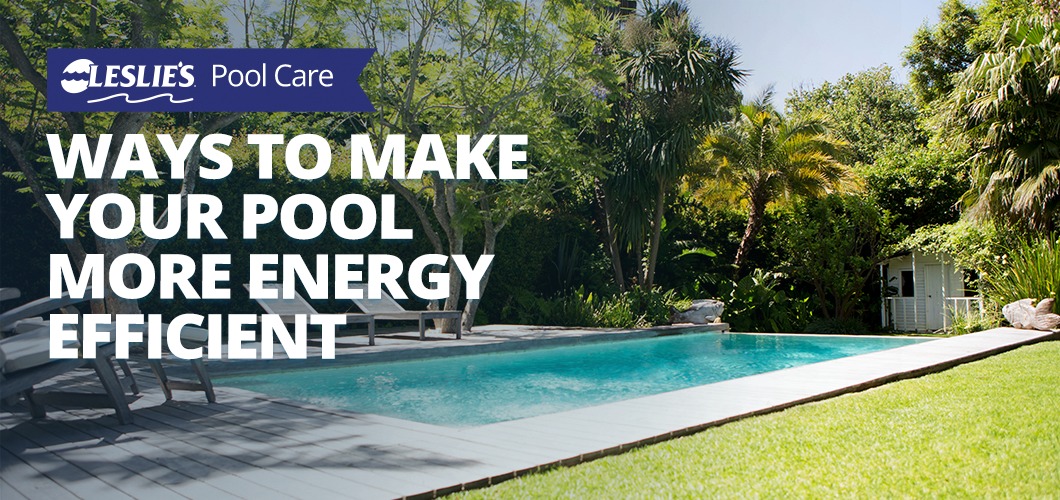
Ways to Make Your Pool More Energy Efficient
Owning a swimming pool is a wonderful luxury, but it can also be a substantial drain on energy resources and your wallet. Energy-hungry pumps, heaters, and lighting systems can quickly lead to high utility bills and have a negative impact on the environment. However, with some thoughtful planning and a few strategic changes, pool owners can significantly improve their pool’s energy efficiency while still enjoying all the benefits of a sparkling oasis in their backyard. In this article, we’ll explore some effective ways to make your pool more energy efficient.

What It Means to Have an Energy-Efficient Pool
It goes without saying that one of the biggest expenses for pool owners is energy. In fact, one study found that homes with pools use about 49% more electricity per year. At its core, having an energy-efficient pool simply means that it generates the lowest possible energy bill every month.
All it takes is a few adjustments to reduce these costs dramatically for you and your home. When it comes to energy efficiency, a little change goes a long way.
Purchase a Variable Speed Pump

Variable speed pumps allow you to control the speed of the motor according to your specific needs. You can choose the speed you need instead of running at full horsepower, like with single speed pumps. While initially costlier to purchase than single speed pumps, variable speed pumps can save you more than the difference of cost over time. Pool owners with variable speed pumps often save up to 90% in pool energy costs, depending on location and other factors.
Often part of the Energy Star program, variable speed pumps are certified by both the U.S. Department of Energy and the U.S. Environmental Protection Agency to use less energy, and ultimately save you on your monthly energy bill. In fact, as of July 2021, the Department of Energy enacted a new set of minimum performance standards for homes and businesses in the United States. What does this mean for pool owners? It means that manufacturers must meet specific efficiency requirements for their pumps and motors. Thus, a majority of single speed pool pumps can no longer be legally produced. This is why most of the pool pumps available for purchase are now variable speed.
BONUS TIP: Buying a variable speed pump may also qualify you for incentives, such as utility rebates. Power companies sometimes offer rebates to entice you to reduce your power consumption by using energy-efficient appliances. This enables utility providers to meet their legal obligations to reduce energy use.
Use Robotic Pool Cleaners

Unlike other types of pool cleaners, such as suction side or pressure side, robotic pool cleaners work autonomously. They don’t need your pool’s circulation or filtration system to function. Therefore, they don’t need to consume extra power to keep your pool dirt-free. Another great thing about robotic pool cleaners? Most models only cost 5 cents per hour (on average) for electricity to clean your pool. Most robotic cleaners usually take about three hours to finish a full cleaning cycle. So that means it costs a mere 15 cents to complete a full cycle of cleaning.
Robotic cleaners operate directly from an independent low-voltage source, which eliminates the need to increase pump speed during cleaning cycles. This allows variable speed pool pumps to work at the lowest flow for the longest time to achieve maximum energy savings. To be more specific, robotic pool cleaners use about 180 watts. A pressure side cleaner often requires a booster pump, which may need more than 1,000 watts, or 1 kilowatt, to run. That’s an 820-watt difference — 82% less — in power consumption.
Let’s not forget that you virtually don’t have to do anything when it comes to a robotic pool cleaner. You only need to set your unit, place it on the water, and watch it do its magic.
Light Up Your Pool with LED

LED lights are one of the most popular energy-efficient upgrades for swimming pools. Now that there's a greater emphasis on energy efficiency, LED technology is quickly replacing incandescent and halogen bulbs. The LED fittings work by pumping voltage through the semiconductor to emit light, whereas incandescent and halogen lights rely on burning filaments.
LED lights provide the highest ratio of lumens per watt. The result is a pool light that provides more light while using less energy than traditional pool light options. For example, A 55-watt LED light is equivalent to a 500-watt incandescent light. However, it only uses 34 to 55 watts of energy.
Although certain halogen lights can produce brighter, more focused light, they use much more energy than LED lights. As LED technology advances, the brightness of these lights continues to increase, and certain brands produce more lumens than others. Quality LED brands have a service lifespan of 25,000 to 50,000 hours, and some can last up to 100,000 hours. With the lamps lasting longer than other light fittings, LED lights typically require fewer replacements. This can ultimately save you even more money.
It's worth noting that the laws for light efficiency are constantly evolving. Effective January 1, 2023, most incandescent lights between 35 and 300 watts will not meet the Department of Energy's lighting efficiency standards. After that, inefficient lights will no longer be manufactured or sold. Many spa lights use 100 to 150 watts, and pool lights use 300 watts. Moving forward, energy-efficient LED lights that use fewer watts will be the best way to go!
BONUS TIP: How much do LED pool lights save per month? Learn just how much money you can save by converting your pool to LED lighting! Just check out our LED pool light savings calculator.

Install Solar Covers
Solar pool covers are highly energy efficient due to their ability to harness the sun’s renewable energy to heat and maintain pool water temperatures. These covers, made of polyethylene, capture and trap solar heat, preventing it from escaping into the atmosphere. Polyethylene solar covers can be used whenever the pool is not in use. But another product, a liquid solar cover, can be used to reduce evaporation and heat loss anytime. However, liquid solar covers cannot effectively transfer heat from the sun like a polyethylene cover can.
Although polyethylene solar pool covers help warm the water by up to 15ºF by trapping heat energy from the sun, their primary function is to reduce evaporation. Since evaporation is the main culprit of heat loss in a pool, using a solar cover helps significantly reduce the loss of heat generated by a pool heater or heat pump. This translates into substantial energy savings, because pool heaters consume a significant amount of gas or electrical energy to warm the water. In fact, most pool owners usually see a 50–70% savings in their energy bill during the cooler spring and fall months by simply using a solar cover to preserve heat. Solar covers can also be paired with solar pool heaters for an even greener heating alternative.
Solar pool covers not only help extend the swimming season by keeping the water comfortably warm, but also reduce the overall carbon footprint associated with pool heating, making them an eco-friendly choice for pool owners. As an added bonus, they can save you quite a bit of money on water and chemicals, too!
Use Cartridge Filters

While filters themselves aren’t energy hogs, an inefficient or dirty filter forces your pump to work harder, and that does drain energy. If you have a sand or diatomaceous earth (DE) filter, consider switching to a cartridge filter. They’re easier on your pump, and do not waste water through backwashing like the other types of filters. A cartridge filter only needs to be rinsed with a hose, and uses far less water. What’s more, it can operate with lower levels of water flow. This consumes less electricity over time and can potentially keep your energy costs low — especially when paired with a variable speed pump!
Enable Pool Automation
Pool automation offers significant energy savings benefits by allowing pool owners to efficiently control and optimize various aspects of their pool’s operation. With the ability to schedule and remotely manage pool equipment such as pumps, heaters, and lighting, pool automation systems enable you to run these devices only when necessary, reducing energy consumption. By fine tuning pool equipment and reducing unnecessary energy use, pool automation not only helps save on energy costs but also contributes to a more eco-friendly and sustainable pool operation.
Transforming your pool into an energy-efficient oasis is not only good for your wallet, but also for the environment. By making smart choices and investing in energy-efficient equipment and practices, you can reduce your pool’s energy consumption while still enjoying the refreshing pleasures of your backyard retreat. Embrace these tips, and you’ll not only be making your pool more energy efficient, but also contributing to a greener and more sustainable future. For more information or to get started with energy-efficient pool solutions, call or stop by your local Leslie’s. You can also browse our online selection of pool products that offer energy, water, and chemical savings, or check out our Resource Center for more eco-friendly pool tips.